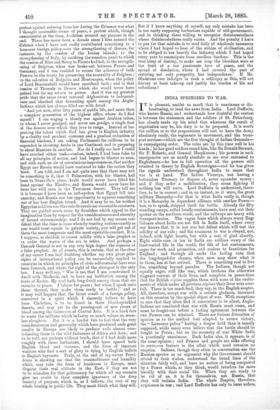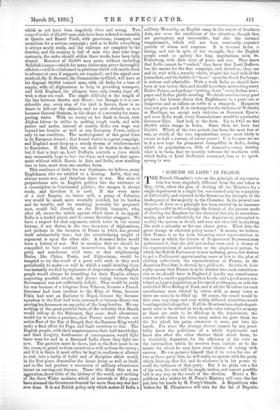INDIA SPRINGING TO WAR.
IT is pleasant, amidst so much that is wearisome or disheartening, to read the news from India. Lord Dufferin, who knows Russia, and understands how doubtful the contest is between the statesmen and the soldiers of St. Petersburg, has clearly made up his mind that whatever the result of negotiation may be, his duty is to be prepared. It is worth the million or so the preparations will cost to have the Army absolutely ready, the regiments in movement, and the transport services—which are the first thought of Indian Generals— in campaigning order. The reins are by this time well in his hands ; he has good soldiers round him, like Sir Donald Stewart, Sir F. Roberts, and General Macpherson ; his powers in such emergencies are as nearly absolute as are ever entrusted to Englishmen—he has in full operation all the powers still retained in theory by English Sovereigns—and he has given the signals understood throughout India to mean that war is at hand. The Indian Viceroys, not having a bottomless Treasury to dispose of, never squander money ; and if they order a mobilisation, they mean fighting if nothing less will serve. Lord Dufferin is understood, therefore, to be in earnest ; and in an instant, as it were, the great military Monarchy—for that is what India really is, though it is a Monarchy in dependant alliance with another Power— has, so to speak, stripped itself for battle. Already the fifty standing camps, called locally cantonments, have sent out their quotas on the northern roads, and the railways are heavy with transport-trains. The vague fears which always worry Englishmen about India are not felt in India itself, where every one knows that it is not war but defeat which will test the solidity of our rule ; and the summons to war is obeyed, not, indeed, with light hearts, but with a sort of glad alacrity. Eight white men in ten in India are soldiers weary of the least-varied life in the world, the life of hot cantonments, eager for work and promotion, and zealous to fanaticism for England ; and through all ranks the feeling runs that the long-hoped-for chance, when men may show what is in them, has at last arrived. There is something real to live for, sonaething beyond parades. The Indians, though not equally eager, still like war, which freshens the otherwise stagnant current of their lives, and complain in peace-time that the British regime supplies them with none of the excitements of which under all previous regimes their lives were overfull. There is too much lead, they say, in the English sceptre. All, therefore, accept war with a certain gladness, increased on this occasion by the special object of war. With exceptions so rare that they often find it convenient to be silent, AngloIndians are convinced that war with Russia must come, and must be fought-out before a lasting agreement between the two Powers can be attained. There are furious diversities of opinion as to the method best adapted to secure victory, the "Lawrence policy" having a deeper hold than is usually supposed, while many even believe that the battle should be fought in Persia ; but on the necessity of war White India is practically unanimous. Dark India also, it appears, is of the same opinion ; and Princes and people are alike offering to serve,—a feature in the affair which need occasion no surprise. Indians, though they often in conversation use the Russian spectre as an argument why the Government should attend to their wishes, understand the broad lines of the situation fairly well, and have no notion of being conquered by a Power which, as they think, would interfere far more harshly with their social life. When they are ready to be rid of us, it is for themselves, not Russia, that they will reclaim India. The whole Empire, therefore, acquiesces in war ; and Lord Dufferin has only to issue orders, which as yet have been singularly clear and strong. Two CO3 d'armee of 25,000 men each have been ordered to assemble at Quetta and Rawul Pindi, with provisions, transport, and munitions for a serious campaign ; and as in India everything is always nearly ready, and the railways are complete to the frontier, and the country is full of men who dare take large contracts, the order should within three weeks have been fully obeyed. Reserves of 30,000 men more, without including Scindialfs army—which for many duties may prove thoroughly efficient—will be echelonned in positions which will enable them to advance at once if supports are required ; and the signal once received, Sir D. Stewart, the Commander-in-Chief, will have at his disposal 80,000 trained men, with all India for a base of supply, with all Afghanistan to help in providing transport, and with England, the ultimate base, only twenty days' off, with a clear sea road. The single difficulty is the length of the line between Quetta and Herat ; but though it is a considerable one, every step of the road is known, there is no desert to kill-out the animals, and no such obstacle as now harasses General Graham, in the shape of a necessity for transporting water. With no enemy on her flank to dread, with Afghan labour to utilise in making rough roads, and with ponies and mules, instead of camels, India can wage war beyond her frontier as well as any European Power, subject only to one condition. The motive-power of this great force is its European kernel ; that kernel wastes in a great campaign, and England must keep-up a steady stream of reinforcements to Kurrachee. If that fails, we shall be beaten in the end ; but if that is kept up, Lord Dufferin controls a force which may reasonably hope to face the Czar, and compel that agreement without which Russia in Asia and India, now standing face to face, must wear one another down.
• This readiness of India for war displeases, we believe, many Englishmen who are entitled to a hearing. India, they say, always wants war, and therefore there is war. Her state of preparedness acts in English politics like the existence of a conscription in Continental politics ; the weapon is always ready, and therefore it is used. If she were more of a civil Empire, or, better still, a group of Colonies, war would be much more carefully avoided, for its burden and its trouble, and its resulting necessity for preparedness, would fall directly on the British taxpayer, who, after all, issues the orders against which there is no appeal. India is a loaded pistol, and its owner therefore swaggers. We have a respect for that argument, which twice in our recent history, if not thrice, in the two invasions of Afghanistan, and perhaps in the invasion of Persia in 1856, has proved itself substantially true ; but the overwhelming weight of argument is upon the other side. A disarmed India would have a history of war. Not to mention that we should be compelled to face constant insurrections, that is, to wage petty and murderous civil wars, or that neighbouring States, like China, Persia, and Afghanistan, would be tempted to try the result of a great raid such as they used periodically to make—a raid in which a small invading force was instantly swelled by regiments of desperadoes—the English people would always be trembling for their Empire, always suspecting possible attack, and always raging because their Government was not sufficiently defiant. They would be ready for war because of a telegram from Teheran, because a French Governor had been insolent to the King of Siam, because Pekin had sent an Embassy to Nepal, because the German squadron in the East had been increased, or because Russia was moving her horsemen on any point of the long frontier. We say nothing of the great positive facts, of the certainty that Russia would roll-up to the Suleiman, that some Arab adventurer would try to seize a province, that France would dictate our action East of the Bay of Bengal, that the Burmese King would make a final effort for Pegu, and limit ourselves to this. The English people, with their suspiciousness, their half-knowledge, and their haughty fearlessness of consequences, would fight three wars for and in a disarmed India where they fight one pow. The garrison must be there, just as the fleet must be on the ocean, to guard us from ourselves as well as from the enemy ; and if it is there, it must either be kept in readiness or allowed to sink into a laxity of habit and of discipline which would, in the first place, demoralise the home Army as well as itself, and in the end produce a succession of military adventurers intent on carving-out thrones. Those who think this an exaggeration, know little of the history of the world, and nothing of the three White mutinies which at intervals of fifty years have alarmed the Governors-General far more than any war had ever done. It is not British policy only which makes of India a military Monarchy, an English camp in the centre of Southern Asia, nor even the conditions of the situation, though they are peremptory and irreversible, but also the national temperament, which will not bear constantly -repeated periods of alarm and suspense. It is because India is strcng, and not in spite of her strength, that the English people await so quietly the long negotiations 'with St. Petersburg, with their issue of peace and war. They know that India cannot be "rushed," they know that Lord Dufferin has the means for the first campaign, and, therefore, they can and do wait with a serenity which, despite the loud talk of the journalists, and the babble of "bears" upon the Stock Eschange, is serious and admirable. With a weak India we should have been at war before this, and should have been mistrusting every Native Prince, and perhaps" putting down "every Indian newspaper and Indian public meeting. We think ourselves very good people ; but history shows that Englishmen in a panic are as dangerous and as callous as cattle in a stampede. Humanity does not gain much if, in exchange for the victories of Wellesley or Hard inge, we accept such victories as Governor Eyre's ; and were India weak, every Commissioner would be a potential Governor Eyre. Just look at the facts. Up to 1857 we had 20,000 white troops in India. Since then we have had 60,000. Which of the two periods has been the most free of war, or which of the two organisations seems most likely to secure us half a century of serene peace ? It is because we see in it a new hope for permanent tranquillity in India, during which its population—a fifth of humanity—may develop what is in them, that we heartily welcome the readiness with which India, at Lord Dufferin's command, has, so to speak, sprung to war.



































 Previous page
Previous page